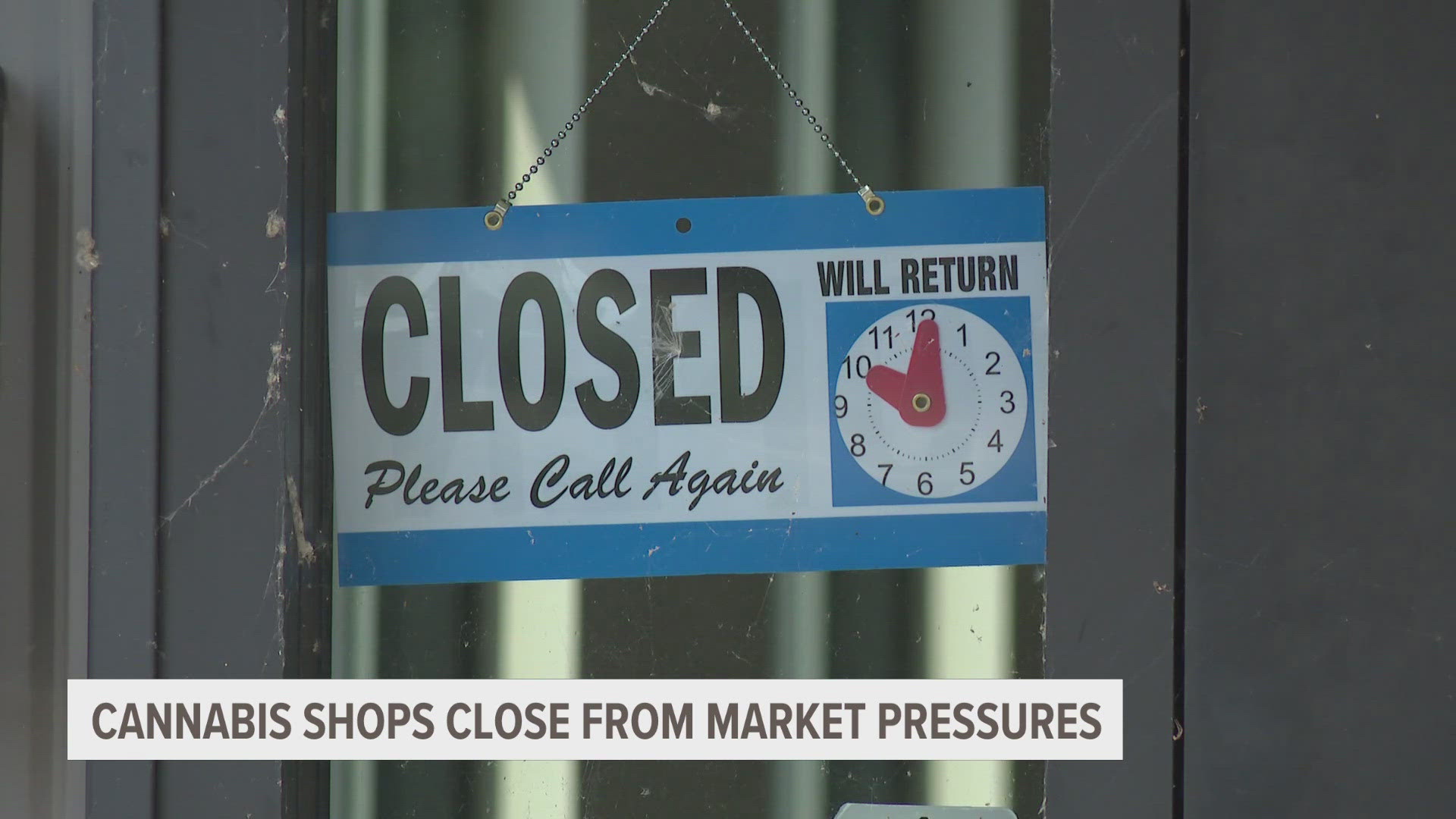LOWELL, Mich. — Six years after the legalization of marijuana in Michigan, cannabis dispensaries are closing across the state. Experts say it's because the market is finally catching up.
The city of Lowell was one of the first cities to allow the licensure of dispensaries in Michigan, at one point being the only city serving all of Kent County. At the city's peak in 2022, according to city manager Mike Burns, there were nine dispensaries for recreational marijuana and three cannabis grow centers.
Today, the city is down four out of its nine recreational shops.
"We knew that the free market was probably going to take place here. We knew that there were never going to be nine facilities running at the same time," Burns said. "We're not surprised by this at all."
Josh Covert is the current CEO of Meds Cafe, the first Marijuana shop opened in Lowell. Before his ventures into the business world, Covert worked as a criminal defense attorney defending marijuana caregivers and patients.
"There's a lot of factors that led to Lowell having nine [dispensaries], I would say," Covert said. "There weren't a lot of cities opting in when Lowell did. There were only so many places in the state that you could put a dispensary in. There were certainly a lot of people across the country that were interested in putting in dispensaries."
Seven years ago, Covert founded the Michigan Cannabis Lawyers, a group still in operation today- using his platforms to advocate for Marijuana's legalization, working on the board of MI Legalize.
"Lowell came in at the right time, in some respects," Covert said. "Quite a few spots were eligible for licensing in Lowell."
Covert said it didn't take long for the city to recognize any potential value in new dispensaries.
"They started creating jobs, for one. They also started receiving tax revenue from the adult use sales tax," Covert said. "The city was receiving, it's kind of varied from year to year, but between 50 and 60 thousand dollars per retail establishment."
For every dispensary in Lowell, the city takes a 10% excise tax on top of an extra 6% adult use sales tax. The result is thousands of extra dollars per month the city puts towards paving their roads.
"We have paved many, many streets in the last four years that we would not have paved were it not for the marijuana excise tax," Burns said. "It's been a benefit to us."
Now, with nearby towns opting into licensing marijuana shops, Covert explained, means the number of people Lowell's dispensaries serve drops dramatically- leaving only the remaining five dispensaries with consistent customers afloat.
With fewer stores to purchase marijuana products from, the city is at risk of losing money. Burns said, however, that he's not worried.
"We're not the only city in the state that's losing facilities," Burns said. "The market is correcting itself, basically."
"When you look at the sales statewide," Burns added. "The sales statewide are still going up significantly. We're going to be getting roughly close to the same amount of money we were getting when we had eight facilities, compared to now when we have five."
Adding on to the typical market stresses, Covert said the cannabis industry is unpredictable- requiring knowledge and experience most new dispensary owners do not have.
"We have a lot of different constraints and pressures being from you know, the state regulations the IRS is taxing us, different than any other industry," Covert said. "Then we have it's a brand-new industry with lots of different fluctuations in supply and demand."
Even further, Covert says the nature of cannabis itself, coming from a plant, causes more issues new dispensary owners are not aware of.
"Harvest isn't always the same. Someone might have a bad harvest, so that kind of puts that kink in the supply chain, so to speak," Covert said. "It's not maybe as predictable as some other industries and other aspects."
"All of those things kind of contribute to making it really complex to run a cannabis business," Covert said.
Covert said he believes the cannabis market will eventually find its equilibrium- where shops service a sustainable number of people at the right prices and where less experienced dispensary owners are shut out.
Until then, Covert said the cannabis market could be volatile.
"Over the next couple years, I think we'll see some retractions in some markets and expansions in other markets," Covert said. "That's really just because it's still so localized, and it's because the municipalities hold control, and as we start to see more and more municipalities opt-in, we're certainly going to see expansion in those areas, but we might see a retraction in some others."
Covert said he believes Michigan's cannabis industry is only just beginning to find its footing.
"We haven't really peaked for cannabis sales, and that's because there's still large pockets of the state that don't have available access to, you know, the medicine or the adult use product," Covert said. "We're at a spot now where it's as we expand and the other states take away, I can see us kind of plateauing around the level we're at now for the next several years."

